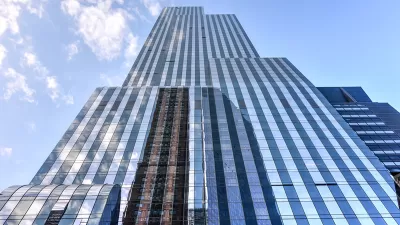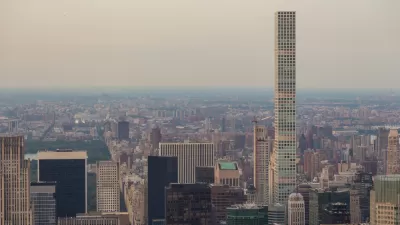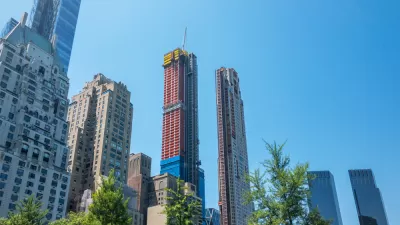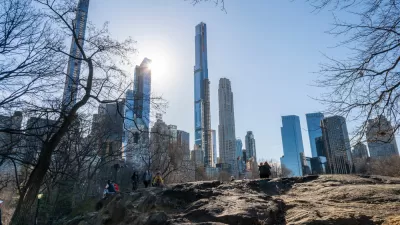The city is responding to controversies surrounding building practices that boost heights of luxury residential towers, while leaving big sections of the buildings empty.

"The de Blasio administration is accelerating plans to tighten a loophole that allows developers to boost the height of luxury apartment buildings," reports Joe Anuta.
"Zoning rules currently allow developers to build mechanical floors with extraordinarily high ceilings, which boosts the height of a building without changing the number of apartments contained within," explains Anuta of the construction techniques that enables the controversial building targeted by the de Blasio administration. "Stacking units on top of a hollow pedestal gives the apartments better views and makes them more expensive."
Anuta raised awareness of the so-called "mechanical voids" and "stilts" at the center of such buildings came in an article from June 2018. "The city initially had said it would regulate mechanical voids by the end of 2018. However, at the behest of City Council officials, the Department of City Planning said last month that it was expanding the scope of the changes to cover more areas of Manhattan, and the more comprehensive set of rules would be ready by the spring," according to Anuta. Now the process of regulating these buildings is expected to change further, as reported in the source article.
FULL STORY: City fast-tracks crackdown on buildings on stilts

Planetizen Federal Action Tracker
A weekly monitor of how Trump’s orders and actions are impacting planners and planning in America.

Chicago’s Ghost Rails
Just beneath the surface of the modern city lie the remnants of its expansive early 20th-century streetcar system.

San Antonio and Austin are Fusing Into one Massive Megaregion
The region spanning the two central Texas cities is growing fast, posing challenges for local infrastructure and water supplies.

Since Zion's Shuttles Went Electric “The Smog is Gone”
Visitors to Zion National Park can enjoy the canyon via the nation’s first fully electric park shuttle system.

Trump Distributing DOT Safety Funds at 1/10 Rate of Biden
Funds for Safe Streets and other transportation safety and equity programs are being held up by administrative reviews and conflicts with the Trump administration’s priorities.

German Cities Subsidize Taxis for Women Amid Wave of Violence
Free or low-cost taxi rides can help women navigate cities more safely, but critics say the programs don't address the root causes of violence against women.
Urban Design for Planners 1: Software Tools
This six-course series explores essential urban design concepts using open source software and equips planners with the tools they need to participate fully in the urban design process.
Planning for Universal Design
Learn the tools for implementing Universal Design in planning regulations.
planning NEXT
Appalachian Highlands Housing Partners
Mpact (founded as Rail~Volution)
City of Camden Redevelopment Agency
City of Astoria
City of Portland
City of Laramie





























